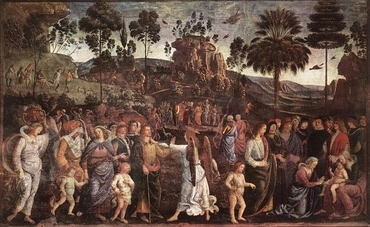4314. In the internal historical sense 'he was limping on his thigh' means that with those descendants goods and truths had been destroyed completely. This is clear from the representation of Jacob, to whom 'he' refers here, as his descendants, dealt with in 4281, and from the meaning of 'limping on the thigh' as those who are without any good or consequently any truth, dealt with in 4302. Here therefore 'he was limping on his thigh' means that with those descendants goods and truths had been destroyed completely.
[2] The nature of that nation is made very plain by many things which the Lord Himself spoke in parables and which in the internal historical sense were said of that nation, as in the following,
In the parable about a certain king who was settling the account with the servant who showed no mercy towards another. Matthew 18:23-end.
In the parable about the householder who let his vineyard out to vine-dressers and went abroad; and the vine-dressers seized the servants he sent, beating one with rods, killing another, and stoning another. At length he sent his son whom they cast out of the vineyard and killed. When the scribes and Pharisees heard this parable they realized that He was speaking about themselves. Matthew 21:33-45; Mark 12:1-9; Luke 20:9 and following verses.
In the parable about the man who gave talents to his servants and how the servant who received one talent went and hid it in the ground. Matthew 25:14-30; Luke 19:12-27.
In the parable about those who came upon the man who had been wounded by the robbers. Luke 10:30-37.
In the parable about those who were invited to the great supper and all of whom made excuses, and of whom the master said, I tell you, none of those men who were invited will taste my supper. Luke 14:16-24.
In the parable about the rich man and Lazarus. Luke 16:19-end.
In the parable about those who despised others compared with themselves. Luke 18:10-14
In the parable about the two sons, one of whom said, I will go off into the vineyard, but did not go, and in which Jesus said, Truly I say to you, Tax collectors and prostitutes will go into the kingdom of heaven before you. Matthew 21:28-32.
[3] The Lord states plainly what that nation was like in Matthew 23:13 onwards, towards the end of which passage He says,
You witness against yourselves that you are the sons of those who slew the prophets; and you are filling up the measure of your fathers. Matthew 23:31-33.
In Mark,
Jesus said to them, Rightly did Isaiah prophesy concerning you, This people honours Me with their lips, but their heart is very far away from Me. In vain do they worship Me, teaching as doctrines the precepts of men, forsaking the commandment of God. Mark 7:6-13.
In John,
The Jews answered Jesus that they were the seed of Abraham. But Jesus said to them, You are from your father the devil, and the desires of your father you will to do. He was a murderer from the beginning, and did not take a stand on the truth because the truth is not in him. When he speaks a lie he speaks from the things that are his own, for he is the teller of a lie and the father of it. John 8:33, 44.
Because their nature was such they are also called 'a wicked and adulterous generation', Matthew 12:39, as well as 'a brood of vipers', Matthew 3:7; 23:33; Luke 3:7; and in Matthew,
O brood of vipers, how can you speak good things when you are evil? Matthew 12:34.
[4] The fact that with that nation not even any natural good was left is meant by the fig tree referred to in Matthew,
Jesus seeing a fig tree by the wayside went to it but found nothing on it but leaves only, therefore He said to it, Let no fruit from now on ever be born from you! Therefore the fig tree withered at once. Matthew 21:19.
'A fig tree' means natural good, see 217. From all these places it may be seen that with that nation goods and truths had been destroyed completely.
[5] Goods and truths are said to have been destroyed when none exist interiorly. Goods and truths which are visible externally derive their being and their life from those that are internal. The nature of internal goods and truths therefore determines that of external ones, however these present themselves to human eyes. There are some people whom I knew during their lifetime and who during that period were to outward appearance zealous for the Lord, for the Church, for their country and the common good, and for what was right and fair; and yet in the next life these same people are among those in hell. Indeed I have been astonished to find them among the most evil ones there. The reason why they were there was that interiorly they had been filthy and profane, and that they had pretended to be zealous for the sake of reputation, so as to gain important positions and also to acquire wealth. Thus they had been zealous for selfish reasons and not for the things which they professed with their lips. Consequently when those external things are laid aside, as happens when people die, internals are laid bare and one sees what those people have been like inwardly; for during their lifetime they had concealed their internals from the eyes of the world. These are the considerations that are meant by the statement that goods and truths have been destroyed completely.







